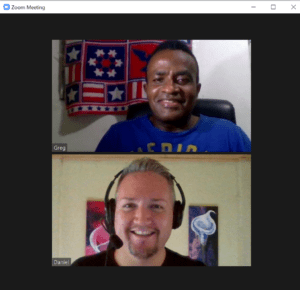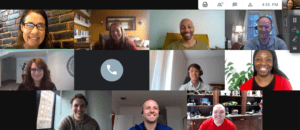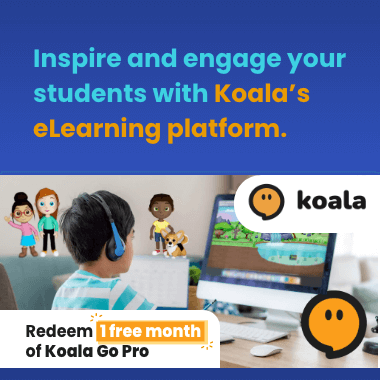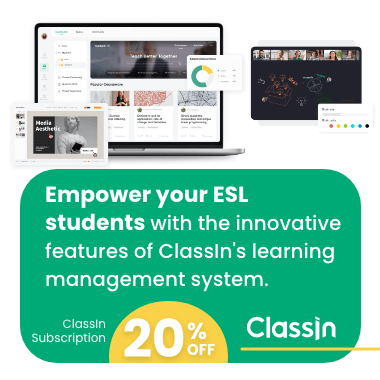Business English instruction has become less centralized and more global, with more learners seeking spots in online classes and an increase in the use of digital materials. Several months into the COVID-19 pandemic, the shock of shelter-in-place mandates had worn off. That is when educational institutions saw interest from individuals and corporations rise. The trend has continued, with schools competing to provide the most personalized content possible.
Carlos Pizarro, regional director for Bridge Languages, said online learning is not “a contingency plan.” Since the pandemic motivated the company to offer only virtual instruction, this model has become the new norm.
“We thought, at first, restrictions on in-person instruction would last for three to six months. Now we look back on that and laugh,” said Pizarro.

In 2020, Bridge Languages moved from a brick-and-mortar operation to a transnational business. It has shifted from offering classes in only one city in South America to offering online courses to students across the continent.
Natalia Bustos, director of marketing and sales for Bridge Languages, said the good news is distance learning has helped instructional companies vastly expand their reach.
“Starting in spring 2020, we went from offering in-person classes in Santiago, Chile to teaching students online in Chile, Argentina, Peru, and the Dominican Republic. Our teachers are now located around the world. Getting to know English instructors from different cultures has helped the students. That has also become a selling point for corporate clients,” said Bustos.
Another trend in business English instruction is the production of COVID-19-specific course content. The pandemic-related materials help students discuss safety protocols and understand them better. They also provide corporations with a workforce that is better positioned to offer goods and services through a global economic recovery.
English language instruction providers are exploring how to help students through the pandemic. Voxy EnGen is a Maryland-based company that provides career-focused English lessons for immigrants, refugees and speakers of other languages across the U.S. using a proprietary web and mobile platform.
“We work to offer lots of support for learners and make materials accessible for those who may not be familiar with digital learning platforms. One of the ways we do that is by making activities ‘bite-size.’ Even if a learner has only 10 minutes a day, we still design our lessons to be incredibly personalized. That way the English they learn is relevant to them,” said Katie Nielson, founder and chief education officer of Voxy EnGen.

Materials that teach students how to be empathetic have become valuable. George Thiess is the director of English2Go, a Heredia, Costa Rica-based private company that offers online instruction to individual and corporate clients. Thiess said English2Go developed an understanding of how to build empathy into language instruction years before the pandemic.
“This is because we taught business English to a number of phone and chat support workers for Tek Experts for their employees that were giving support to Microsoft users. Now that ability is in demand. Companies want to train workers to help customers under high stress who need assistance from a distance,” said Thiess.

The Shift to One-on-One Instruction
“Before the pandemic, we’d go to a student’s home, a client’s office, teach one-on-one, or a group of up to eight. When COVID came, it took 50% of our business, at first. March 2020 was our best month in two years. April 2020 was our worst month in five years. It took until December 2020 to bring our numbers back up. April 2021 was our best month ever.”
Online academies that previously focused on teaching students one-on-one, such as Madrid-based Break Into English, have seen a jump in enrollment. They are particularly seeing interest from students who previously took in-person classes.
“We’ve been teaching online since the company started, through Skype classes. There was a spike in website visits and enrollment at the beginning of the confinement. People made it a priority to use their time productively,” said David Ergas, co-founder of Break Into English.
Ergas said a few students experienced “digital burnout” but worked to overcome it.

Thiess of English2Go said the past year has been completely abnormal.
“Before the pandemic, we’d go to a student’s home, a client’s office, teach one-on-one, or a group of up to eight. When COVID came, it took 50% of our business, at first. March 2020 was our best month in two years. April 2020 was our worst month in five years. It took until December 2020 to bring our numbers back up. April 2021 was our best month ever,” said Thiess.
The difference is that English2Go is now offering instruction solely online.
“I don’t see us going back. The technology is moving fast, and the pandemic sped up the process. We’ve bought software that helps create a study plan based on the gaps in online learning,” said Thiess.
Thiess said one-on-one instruction requires patience, time and understanding.
“Make it fun; don’t take it too seriously. For example, an instructor can share 10 vocabulary words and create a game, the student has to define a word without using it. Yet require self-study and make sure the student makes the progress they want to make, and their employer wants them to make,” said Thiess.
Ergas said even in one-on-one, personalized instruction, Break Into English works to avoid small talk.
“We want to keep students outside their comfort zone and correct their mistakes. Preparing oral presentations and practicing job interviews with the teacher are a couple of our reality-based activities that prepare students for the professional world. This helps them think of more native ways to handle a situation,” said Ergas.
All Done on the App
Not every educational provider of business English relies on the services of an instructor. Numerous companies have created apps that encourage learners to expand their horizons with grammar and vocabulary lessons.
App developers are using algorithms and achievement benchmarks to ensure students stay engaged and challenged. Nielson said Voxy EnGen launched in January 2021. As of June 2021, the app had 8,000 learners.

“We plan to reach 50,000 learners by the end of 2021. The platform adapts to learners, teaching very specific, task-based English skills. The platform measures the learners’ proficiency level and also takes their needs and goals into account,” said Nielson.
Nielson said Voxy EnGen is fully mobile. A learner can complete all lessons on their phone.
“We still integrate what a learner does on their own with live instruction. The idea is a flipped classroom. A learner takes lessons and also attends online classes. Learners must agree to a code of conduct, be present and engage during live instruction,” said Nielson.
Luca Sadurny, co-founder of MosaLingua, a language learning app that has an “English for Business” program within it, said the COVID lockdown resulted in an increase in sales because people had more time to study.
“The pandemic has only affected our business to business (B2B) activity. Companies are investing less in training their employees. We are growing. As of May 20, 2021, [we] had over 11,482,000 downloads,” said Sadurny.

Sadurny said MosaLingua developed the English for Business program based on the request of users, who were eager for this kind of content. Even when using an app, learners need to be at least at a low-intermediate level in English to learn business and professional English.
“Beginners have not yet mastered all the skills needed to get by in many work-related situations. In addition, business professionals need very specific skills such as handling phone calls, negotiation and preparing for job interviews,” said Sadurny.

Sadurny said MosaLingua often complements in-person instruction.
“It integrates very well with other solutions, such as live tutoring,” said Sadurny.
Experiences Will Differ Between Regions
“The corporations that employ the executives who take our programs need to know you are fully committed. In addition, they want their employees to reach a certain level of fluency, particularly in the company’s particular industry. Executives in our programs usually also need to continue to perform their duties for their employers. Since that’s a lot for them to handle, we work to ensure 100% happiness.”
English language schools that offer an experience to go with business English curricula are making strides to highlight the value of in-person experiences. Rennert International, a language school in New York City, offers an exclusive executive language suite that includes classes, apartment accommodation placement, social hours, in-person internships, mentorships and visits to corporate offices for executives learning English. In mid-March 2020, after the city shut down, the school temporarily changed its business model entirely. It began to provide students’ lessons online.
“Yet many executives put their English studies on hold. One of the most appealing aspects of our business and professional English language instruction is the fact that it is fully immersive. We offer a full-service program for executives, which involves picking them up from the airport, providing them with their own suite, holding small classes with a maximum of six students and running special events for them. We offer a group lunch on Mondays and a wine and cheese social every Thursday. The colleagues you meet when you’re in our one-week to 32-week program is important, and furthers the learning process,” said Eimear Harrison, executive vice president of Rennert International.

The school reopened in August 2020 for hybrid learning and fully reopened for 100% in-person classes in May 2021. Harrison said Rennert International planned to restart its in-person executive programs by July 2021.
“Students are already taking private lessons abroad to prepare. Our busy season tends to be late summer into early fall. This is good timing,” said Harrison.
Harrison said Rennert International serves a niche market that requires a full-response approach.
“The corporations that employ the executives who take our programs need to know you are fully committed. In addition, they want their employees to reach a certain level of fluency, particularly in the company’s particular industry. Executives in our programs usually also need to continue to perform their duties for their employers. Since that’s a lot for them to handle, we work to ensure 100% happiness,” said Rennert.
In contrast, Bridge Languages is emphasizing the continued value of online instruction. It is sharing news about the potential of the method with clients who had not wanted to utilize it before the pandemic.
Bustos has this to say about corporations accessing online training for their workers: “Now they are more used to online education. Everyone has seen that online education works. Smaller companies and local companies have shown more interest in signing up their employees for lessons. Further, the tech industry in Latin America has grown over the past year. That benefits us. Tech companies are coming to us to sign up their employees.”
The Definition of Business and Professional English
The material taught in a business English class usually relates directly to what a learner or employer accomplishes at a workplace. Since foreign industries that employ English speakers range from oil and natural gas production to hospitality, the material that learners master varies considerably as well. Daniel Kovacs, vice president of operations at Kaplan, said business and professional English instruction is a small portion of the company’s total student population.

“Students who choose these classes usually have special interests as well, like building and writing their resumes or learning job interviewing skills. We try to tailor the content to what they need,” said Kovacs.
Kovacs said executives and business professionals already have extensive real-world knowledge and work skills.
Thiess said English2Go’s business and professional English classes tend to revolve around work students are already doing.
“We want to make things real, so we learn what our students do. We teach them vocabulary and new directions in which they can take their work. We’re continually tweaking the courses,” said Thiess.
Harrison said Rennert International’s programs can be specialized to help executives in a certain industry, such as tech or finance.
“Also, the topical lectures we organize, the visits we make to companies and sites in New York City, the experiences our students have while performing an internship, encourage linguistic growth and cultural exchanges. Those exchanges occur between teachers and students, among students, and between students and professionals in the city,” said Harrison.
Sadurny said even within an app, MosaLingua is able to customize course content.
“In the future, we aim to create content suited for very specific sectors and industries, such as aerospace, chemical products, pharmacology and mineral extraction. We already cover many industries, but we want to develop more content of this kind,” said Sadurny.
Pizarro said Bridge Languages determines the content of a business or professional English class at the start of the term with the help of a student questionnaire.
“We identify the topics students want to cover and the main goals they want to achieve at their jobs or in their industries. Then we create syllabi and courses that are based on standard material but personalized with student-requested content,” said Pizarro.
Bridge Languages also holds workshops on current topics that relate to workforce dynamics, such as diversity, equity and inclusion.

“We allow students to bring in articles and research reports from news sites like CNN and the BBC. We incorporate these discussions into classes so students understand global conversations,” said Pizarro.
Pizarro said before the pandemic, Bridge Languages used to hold “recoup” classes on-site once a month on Friday afternoons.
“We would gather and have a social hour with employees from different companies. Students would often finish with a happy hour in nearby bars. The pandemic changed that,” said Pizarro.
As of June 2021, Bridge Languages is holding the social hour online.
“It’s been interesting, allowing people in many different locations to share their experiences and talk about their work. It’s given people a break from focusing on their industry-specific material to meet new people all around Latin America,” said Pizarro.
Ergas said personal relationships are important.
“The relationship between a teacher and a student develops over time. Some of our teachers and students have become friends over the years. A number met in person before the pandemic. One way to think of Break Into English’s online instruction is like an enhanced telephone conversation. We have over 15 types of different activities, such as listening exercises, debates, pronunciation, role-plays, picture and image description, built into the classes. In a typical 60-minute class, we will correct homework at the beginning and do three or four activities,” said Ergas.
Looking Forward, With Feedback From Students
“The technology to allow online lessons has gotten better over the years. The pandemic encouraged people to work out the bumps that remained. High-quality internet connections are now more widespread. Students see the advantages of having no commute or parking problems.”
As companies make dramatic, large-scale shifts, they are asking all of their partners, instructors, students, corporate clients, and governments and nonprofits that assist with language instruction, how to improve the experience.
“We’re constantly surveying learners. It’s important that we hear from them in real-time. We want to know what changes as they become more familiar with English and more comfortable in the areas where they live,” said Nielson.
The gradual and safe reopening across the U.S. is helping Voxy EnGen’s learners. They are no longer isolated at home.
“As learners are able to engage with peers and supervisors more, we are finding ways to move them into career pathways and different employment-related programs,” said Nielson.
Ergas said the “technological smoothing out” of the rough spots, like connection and technical issues, helped a great deal.
“The technology to allow online lessons has gotten better over the years. The pandemic encouraged people to work out the bumps that remained. High-quality internet connections are now more widespread. Students see the advantages of having no commute or parking problems,” said Ergas.
Thiess said it’s important to remember that everyone is still experiencing stress from the past year. Teachers and students continue to deal with concerns related to the pandemic.
“In Costa Rica, our hospitals are saturated with COVID-19 patients. One of our teachers had a fiancé who recovered from COVID. We don’t always know what everyone is dealing with. We give our teachers pep talks. We also set rules for online classes. Learners can’t just connect to class through Zoom on their phone and be inactive. We make sure they are in a device with a camera turned on, ready to respond,” said Thiess.
Bustos said one of the keys to thriving after the pandemic is communication. She explained it is especially important to keep in touch with corporate clients that encourage students to learn business and professional English.
“As our instructors teach and test students in business and professional English, our marketing and sales teams reach out to their managers. We ask what needs they have now and what needs they expect to have in the future,” said Bustos.
What’s Next for Business English Instruction?
The recovery period from the pandemic promises to be rocky, especially in countries like Brazil, where vaccines are just beginning to become more widely available. Even as vaccination rates rise, materials regarding safety measures for COVID-19 will continue to be in demand. Although corporate and individual learners’ interest in improving their communication skills remains high, it is harder for English language instructional companies to invite clients in to see how learning is occurring. This is because so much instruction and interaction is still occurring online.
Bustos explained that this is why Bridge Languages is working to strengthen its relationships with clients: “We are maintaining the connection so we can keep offering classes to a wide region. This will ensure online learning remains the primary method of instruction.”






